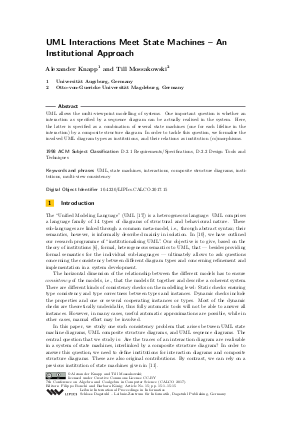UML Interactions Meet State Machines - An Institutional Approach
Authors Alexander Knapp, Till Mossakowski
-
Part of:
Volume:
7th Conference on Algebra and Coalgebra in Computer Science (CALCO 2017)
Part of: Series: Leibniz International Proceedings in Informatics (LIPIcs)
Part of: Conference: Conference on Algebra and Coalgebra in Computer Science (CALCO) - License:
 Creative Commons Attribution 3.0 Unported license
Creative Commons Attribution 3.0 Unported license
- Publication Date: 2017-11-17
File

PDF
LIPIcs.CALCO.2017.15.pdf
- Filesize: 0.64 MB
- 15 pages
Document Identifiers
Subject Classification
Keywords
- UML
- state machines
- interactions
- composite structure diagrams
- institutions
- multi-view consistency
Metrics
- Access Statistics
-
Total Accesses (updated on a weekly basis)
0PDF Downloads0Metadata Views
Abstract
UML allows the multi-viewpoint modelling of systems. One important question is whether an interaction as specified by a sequence diagram can be actually realised in the system. Here, the latter is specified as a combination of several state machines (one for each lifeline in the interaction) by a composite structure diagram. In order to tackle this question, we formalise the involved UML diagram types as institutions, and their relations as institution (co)morphisms.
Cite As Get BibTex
Alexander Knapp and Till Mossakowski. UML Interactions Meet State Machines - An Institutional Approach. In 7th Conference on Algebra and Coalgebra in Computer Science (CALCO 2017). Leibniz International Proceedings in Informatics (LIPIcs), Volume 72, pp. 15:1-15:15, Schloss Dagstuhl – Leibniz-Zentrum für Informatik (2017)
https://doi.org/10.4230/LIPIcs.CALCO.2017.15
BibTex
@InProceedings{knapp_et_al:LIPIcs.CALCO.2017.15,
author = {Knapp, Alexander and Mossakowski, Till},
title = {{UML Interactions Meet State Machines - An Institutional Approach}},
booktitle = {7th Conference on Algebra and Coalgebra in Computer Science (CALCO 2017)},
pages = {15:1--15:15},
series = {Leibniz International Proceedings in Informatics (LIPIcs)},
ISBN = {978-3-95977-033-0},
ISSN = {1868-8969},
year = {2017},
volume = {72},
editor = {Bonchi, Filippo and K\"{o}nig, Barbara},
publisher = {Schloss Dagstuhl -- Leibniz-Zentrum f{\"u}r Informatik},
address = {Dagstuhl, Germany},
URL = {https://drops.dagstuhl.de/entities/document/10.4230/LIPIcs.CALCO.2017.15},
URN = {urn:nbn:de:0030-drops-80346},
doi = {10.4230/LIPIcs.CALCO.2017.15},
annote = {Keywords: UML, state machines, interactions, composite structure diagrams, institutions, multi-view consistency}
}
Author Details
References
-
Umesh Bellur and V. Vallieswaran. On OO Design Consistency in Iterative Development. In Proc. 3superscriptrd Intl. Conf. Information Technology: New Generations (ITNG'06), pages 46-51. IEEE, 2006.

-
Mihai Codescu, Till Mossakowski, Don Sannella, and Andrzej Tarlecki. Specification Refinements: Calculi, Tools, and Applications. Sci. Comp. Prog., 2017. To appear.

-
Gregor Engels, Reiko Heckel, and Jochen Malte Küster. The Consistency Workbench: A Tool for Consistency Management in UML-Based Development. In Perdita Stevens, Jon Whittle, and Grady Booch, editors, Proc. 6superscriptth Intl. Conf. Unified Modeling Language (UML'03), volume 2863 of Lect Notes Comp. Sci. Springer, 2003.

-
José Luiz Fiadeiro. Categories for Software Engineering. Springer, 2005.

-
Martin Glauer. Institution for Hierarchical UML State Machines. Master thesis, Otto-von-Guericke-Universität Magdeburg, 2015.

-
Joseph A. Goguen and Rod M. Burstall. Institutions: Abstract Model Theory for Specification and Programming. J. ACM, 39:95-146, 1992.

-
Joseph A. Goguen and Grigore Roşu. Institution Morphisms. Formal Asp. Comp., 13:274-307, 2002.

-
Rolf Hennicker, Michel Bidoit, and Thanh-Son Dang. On Synchronous and Asynchronous Compatibility of Communicating Components. In Alberto Lluch-Lafuente and José Proença, editors, Proc. 18superscriptth IFIP WG 6.1 Intl. Conf. Coordination Models and Languages (COORDINATION'16), volume 9686 of Lect. Notes Comp. Sci., pages 138-156. Springer, 2016.

- Alexander Knapp and Till Mossakowski. Multi-view Consistency in UML, 2016. URL: https://arxiv.org/abs/1610.03960.
-
Alexander Knapp, Till Mossakowski, and Markus Roggenbach. An Institutional Framework for Heterogeneous Formal Development in UML. A Position Paper. In Rocco De Nicola and Rolf Hennicker, editors, Software, Services, and Systems. Essays Dedicated to Martin Wirsing on the Occasion of His Retirement from the Chair of Programming and Software Engineering, volume 8950 of Lect. Notes Comp. Sci., pages 215-230. Springer, 2015.

-
Alexander Knapp, Till Mossakowski, Markus Roggenbach, and Martin Glauer. An Institution for Simple UML State Machines. In Alexander Egyed and Ina Schaefer, editors, Proc. 18superscriptth Intl. Conf. Fundamental Approaches to Software Engineering (FASE'15), volume 9033 of Lect. Notes Comp. Sci., pages 3-18. Springer, 2015.

-
Alexander Knapp and Jochen Wuttke. Model Checking of UML 2.0 Interactions. In Thomas Kühne, editor, Reports Rev. Sel. Papers Ws.s Symp.s MoDELS 2006, volume 4364 of Lect. Notes Comp. Sci., pages 42-51. Springer, 2007.

-
Kevin Lano, editor. UML 2 - Semantics and Applications. Wiley, 2009.

-
Till Mossakowski, Mihai Codescu, Fabian Neuhaus, and Oliver Kutz. The Distributed Ontology, Modelling and Specification Language - DOL. In Arnold Koslow and Arthur Buchsbaum, editors, The Road to Universal Logic - Festschrift for the 50th Birthday of Jean-Yves Beziau, vol. II, Studies in Universal Logic. Birkhäuser, 2015.

-
Till Mossakowski, Christian Maeder, and Klaus Lüttich. The Heterogeneous Tool Set. In Orna Grumberg and Michael Huth, editors, Proc. 13superscriptth Intl. Conf. Tools and Algorithms for the Construction and Analysis of Systems (TACAS'07), volume 4424 of Lect. Notes Comp. Sci., pages 519-522. Springer, 2007.

-
Iulian Ober and Iulia Dragomir. Unambiguous UML Composite Structures: The OMEGA2 Experience. In Ivana Cerná, Tibor Gyimóthy, Juraj Hromkovic, Keith G. Jeffery, Rastislav Královic, Marko Vukolic, and Stefan Wolf, editors, Proc. 37superscriptth Conf. Current Trends in Theory and Practice of Computer Science (SOFSEM'11), volume 6543 of Lect. Notes Comp. Sci., pages 418-430. Springer, 2011.

- Object Management Group. Unified Modeling Language 2.5. Standard formal/2015-03-01, OMG, 2015. URL: http://www.omg.org/spec/UML/2.5.
- Object Management Group. Distributed Ontology, Modeling, and Specification Language (DOL) 1.0 - Beta. Standard ptc/2016-02-37, OMG, 2016. URL: http://www.omg.org/spec/DOL/.
-
Holger Rasch and Heike Wehrheim. Checking Consistency in UML Diagrams: Classes and State Machines. In Elie Najm, Uwe Nestmann, and Perdita Stevens, editors, Proc. 6superscriptth IFIP WG 6.1 Intl. Conf. Formal Methods for Open Object-Based Distributed Systems (FMOODS'03), volume 2884 of Lect. Notes Comp. Sci., pages 229-243. Springer, 2003.

-
Tobias Rosenberger. Relating UML State Machines and Interactions in an Institutional Framework. Master thesis, Universität Augsburg, 2017.

-
Lutz Schröder, Till Mossakowski, and Christoph Lüth. Type Class Polymorphism in an Institutional Framework. In José Luiz Fiadeiro, editor, Rev. Sel. Papers 17superscriptth Intl. Ws. Recent Trends in Algebraic Development Techniques (WADT'04), volume 3423 of Lect. Notes Comp. Sci., pages 234-248. Springer, 2005.

